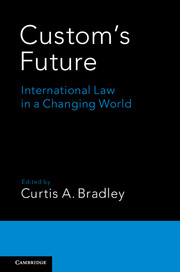Book contents
- Frontmatter
- Dedication
- Contents
- Notes on Contributors
- Introduction: Custom's Future
- 1 Custom's Past
- 2 Customary International Law Adjudication as Common Law Adjudication
- 3 Customary International Law as a Dynamic Process
- 4 Custom, Jus Cogens, and Human Rights
- 5 Customary International Law: How Do Courts Do It?
- 6 Custom's Method and Process: Lessons from Humanitarian Law
- 7 The Growing Obsolescence of Customary International Law
- 8 The Strange Vitality of Custom in the International Protection of Contracts, Property, and Commerce
- 9 The Decline of Customary International Law as a Source of International Criminal Law
- 10 Customary International Law and Public Goods
- 11 Reinvigorating Customary International Law
- 12 The Evolution of Codification: A Principal-Agent Theory of the International Law Commission's Influence
- 13 Custom and Informal International Lawmaking
- 14 Custom's Bright Future: The Continuing Importance of Customary International Law
- Bibliography
- Index
13 - Custom and Informal International Lawmaking
Published online by Cambridge University Press: 05 February 2016
- Frontmatter
- Dedication
- Contents
- Notes on Contributors
- Introduction: Custom's Future
- 1 Custom's Past
- 2 Customary International Law Adjudication as Common Law Adjudication
- 3 Customary International Law as a Dynamic Process
- 4 Custom, Jus Cogens, and Human Rights
- 5 Customary International Law: How Do Courts Do It?
- 6 Custom's Method and Process: Lessons from Humanitarian Law
- 7 The Growing Obsolescence of Customary International Law
- 8 The Strange Vitality of Custom in the International Protection of Contracts, Property, and Commerce
- 9 The Decline of Customary International Law as a Source of International Criminal Law
- 10 Customary International Law and Public Goods
- 11 Reinvigorating Customary International Law
- 12 The Evolution of Codification: A Principal-Agent Theory of the International Law Commission's Influence
- 13 Custom and Informal International Lawmaking
- 14 Custom's Bright Future: The Continuing Importance of Customary International Law
- Bibliography
- Index
Summary
Informal international lawmaking, a phenomenon involving new actors, processes, and outputs, is an important and increasingly common phenomenon of contemporary international life. It has not, however, entirely replaced traditional international lawmaking. In fact, informal international law exists alongside treaties and custom. But while the interaction between treaties and informal law has been consistently addressed in the academic literature, the relationship between customary international law and informal law remains largely neglected, despite the complex questions it raises. First, what explains the rise of informal international law to the detriment of custom? What place is there still for custom in a world of increasing informality? Second, how do custom and informal law interact in practice? Do they merely serve as alternatives in states’ cooperation endeavours, or do they also interact in a complementary manner?
This chapter will attempt to answer these questions. We first examine and explain the rise of informal international lawmaking and the functions it serves. Next, we turn to the place of custom in an age of informality. We then focus on the complementary interaction between custom and informal international law. Finally, we examine the possibility of stretching the boundaries of the traditional international system in order to incorporate informal international lawmaking.
THE RISE OF INFORMAL INTERNATIONAL LAWMAKING
Many authors have recently indicated that international law finds itself in impasse. Indeed, there is a rather broad acknowledgement among international lawyers that traditional forms of multilateralism are facing a deep crisis, and that new multilateral processes have emerged. “What crisis?” one might curiously ask. Contemplate, for instance, all the great challenges to modern international relations: globalization, economic development, global environmental protection, international public health, technology, cybersecurity, and, why not, financial cataclysms. Would you imagine that customary international law (CIL) could effectively address these challenges? Arguably not. Treaty-based hard law, on the other hand, might fit the bill much better. But even the development of treaties is in decline.
The limited scope of Article 38 (1) of the Statute of the International Court of Justice (ICJ Statute) has become ill-suited to address the complexities of global governance. Therefore, in order to circumvent the rigidities and inadequacies of the traditional framework of international law, states have been progressively turning toward informal cooperative fora, radically transforming the international legal order. The ever-changing demands of international society, it seems, have brought into the limelight new, nontraditional types of international lawmaking.
- Type
- Chapter
- Information
- Custom's FutureInternational Law in a Changing World, pp. 332 - 359Publisher: Cambridge University PressPrint publication year: 2016
- 1
- Cited by



